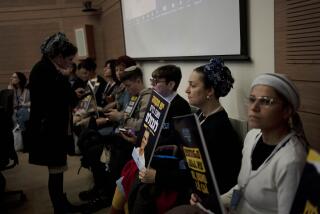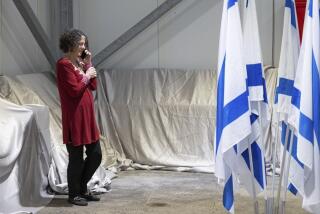Member of Kuwait Royal Family Gasps a Plea That Hijackers’ Demands Be Met
- Share via
ALGIERS — Speaking in a hoarse and anguished whisper, a member of the Kuwaiti royal family appealed to Kuwait on Monday to meet the demands of the hijackers holding 31 hostages aboard a hijacked jumbo jet at the Algiers airport.
The barely intelligible message, delivered by a hostage identified as Fadel al Sabah, a distant relative of the Emir of Kuwait, repeated the hijackers’ demand for the release of 17 Shia Muslim terrorists imprisoned in Kuwait.
Although it was similar to other appeals the hostages have been forced to make by their captors, the desperation and exhaustion in the man’s weakened, pain-racked voice momentarily stunned into silence many of the reporters camped out on the tarmac of the airport.
Gasps Out a Plea
“Please . . . free the prisoners,” were the only words that Arabic speakers monitoring the message from the plane could decipher.
Gasping for breath, the man tried to identify himself, but his voice trailed off in an anguished moan.
A hijacker, calmly speaking English, came on the radio afterward and identified him as Al Sabah, a 33-year-old businessman who was one of three royal family members on board the Kuwait Airways Boeing 747, hijacked April 5.
An Algerian mediator went on board the plane, parked a few hundred yards from the airport terminal, at least twice during the day. Kuwaiti sources said the talks centered on efforts to persuade the hijackers to release at least some of their remaining hostages as a good-will gesture marking the start of Ramadan, the Muslim holy month of fasting that began Sunday night.
No Sign of Progress
However, as night fell and darkness enveloped the blue-and-white jumbo jet in shadows, there was no outward sign of any progress in the deadlocked negotiations, now in their fifth day in Algiers. Earlier, the jet had spent five days in Larnaca, Cyprus, after being flown there from Mashhad, Iran, its first stop in a terror-filled fortnight.
The eight heavily armed hijackers are seeking the release of 17 Shia extremists held in Kuwait for various terrorist offenses, including the 1983 bombings of the French and U.S. embassies there.
Kuwait, which resisted similar pressure when one of its planes was hijacked to Iran four years ago, has rejected the demand.
The hijackers, who are believed to be affiliated with Iran--possibly even receiving orders from the government in Tehran--have repeatedly threatened to blow up the plane, “martyring” themselves and their hostages unless the prisoners in Kuwait are freed.
However, they have promised Algeria they will not do this on Algerian soil, and officials assigned to the talks indicated Monday that the hijackers no longer seem in a hurry to leave.
The bizarre and bloody drama, in which two Kuwaiti passengers have been killed, has come down to a “question of face,” one diplomat here observed.
“It’s clear that the Kuwaitis will not and cannot afford to budge,” he said. “But the hijackers must also feel that they need to get something more in return for releasing the rest of their hostages.”
As the hijacking entered its 14th day, the hostages set what was believed to be a new record for the longest period of confinement aboard an aircraft, eclipsing the 13 days that passengers were held captive aboard a Pakistani airliner hijacked in 1981. The 1985 hijacking of a TWA jetliner lasted longer, but the passengers were taken off the plane and held captive in Beirut for part of their 17-day ordeal.
The strain of the long confinement was obvious in Al Sabah’s voice as he tried twice to read the message that the hijackers ordered him to recite to the control tower.
Speaking in a barely audible whisper, Al Sabah’s voice was unintelligible the first time he read the message. Ordered to repeat it more clearly by one of the hijackers, he gasped out a few words before ending in a pathetic groan, unable to continue.
Nervous Disorder
The one hostage the hijackers have released since the plane landed in Algiers last Wednesday later told reporters that Al Sabah was suffering from a severe nervous disorder, and Monday’s message appeared to confirm his great distress.
Kuwait has asked Algeria not to allow the plane to take off again, but there are signs that the Algerians are beginning to weary of the crisis. When they agreed to permit the plane to land here, the Algerians clearly expected the hijackers to free their hostages and surrender quickly.
But after landing, the hijackers appeared to have reneged on this understanding, said to have been reached through PLO mediation while the plane was in Cyprus.
This has reinforced suspicion that the terrorists are receiving outside instruction, as Palestine Liberation Organization leader Yasser Arafat charged before pulling the PLO out of the negotiations after the plane left Cyprus.
Arafat Blames Iran
Arafat has accused Iran of masterminding the hijacking, and several of the 71 passengers freed earlier in the ordeal also have said that at least one terrorist boarded the plane during its stop in Mashhad.
However, Kuwaiti officials have said that the presence of three royal family members aboard the plane will not affect their refusal to negotiate with the terrorists. Indeed, reports from Kuwait on Monday said the government was by now resigned to losing the lives of the remaining hostages and was treating the hijacking “like a plane crash in which the lives of all the passengers are lost.”
More to Read
Sign up for Essential California
The most important California stories and recommendations in your inbox every morning.
You may occasionally receive promotional content from the Los Angeles Times.













